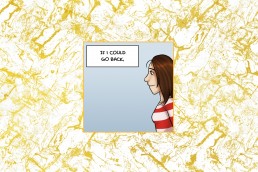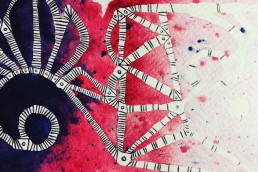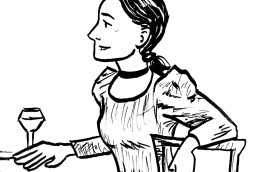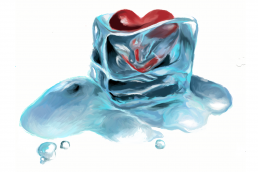by Tamara-Louise Zeyen
Image credit: Carli Jeen via Unsplash
Nowadays it is trendy to take care of yourself. Everyone is rushing to their next yoga class, just to learn how to be calm and mindful. When I first stumbled over the concept of self-compassion, I was less than thrilled. “Great,” I thought. “Another thing that I have to be good at and that I need to apply in my daily life”. Just add it to the list of things like “eat Buddha bowls more often” or “get up at sunrise to do sports”. Oh and don’t forget to give 100 percent at everything you do, including your relationships, studies, job, internships and of course volunteering (which sometimes occur all in one day). I don’t know about you, but some days my personal “100 percent” just doesn’t seem to be enough. There is always something left on the to-do list, even though I already stayed up late to bake this cake for the breakfast event tomorrow (vegan and soy-free of course, just to make sure everyone can eat it). Ironically this self-care trend had left me a lot more stressed than I was before.
Naturally this new concept of self-compassion made me roll my eyes at first, because honestly most of the time I didn’t want to be compassionate towards myself. I would rather beat myself up for not getting everything done in the day, for scrolling through social media for way too long or for skipping some great opportunity at work because I’m too shy. I would lie in my bed at night and get angry and frustrated with myself, because it certainly seems like everyone else has everything together, but not me.
But as luck would have it, I had to write an academic essay about self-compassion in the helping professions, which lead me to dig deep into research about compassion fatigue, burnout and of course self-compassion. “Ok now I really have to get to know this subject and maybe, just maybe, I can take something from this for my personal life.” The concept of self-compassion is mostly known through the work of educational psychologist Kristin Neff. Neff modified a prior model about “unconditional self-acceptance” in such a way that self-compassion also leads to emotional equanimity and the recognition of interconnectedness.1 Altogether self-compassion is formed by three basic qualities: kindness towards yourself, recognition of the common humanity that connects us all, and mindfulness regarding negative thoughts and emotions.2 This should lead the practitioner to give themselves unconditional acceptance rather than being harsh on themselves. They can still recognise and see behaviours and thoughts that need to change but they are able to do so without cruel judgment.
So wait a moment. Can these three qualities be the answer to all of my stress and worries? If I just become a self-compassion ninja would I worry less about my unfinished to-do lists and instead feel okay about them? Suddenly I could not wait to put this into practice. But as you might have guessed, it was not the easiest thing to do. Normally when things get hard humans tend to fall into control and fix mode. Instead, using self-compassion, we must try to pause for a moment to give ourselves some comfort.3 Turns out I was really bad at this. It is so easy for me to rush over my own feelings and just go into control and repair mode. I had no other choice but to take very small steps and by small steps I mean literally only allowing myself one deep breath before I went into action. I would still do what I thought had to be done in the situation, but this time I would acknowledge that this was actually stressful for me.
But what really moved me was the whole common humanity aspect: I started to realise that everyone else is also under a lot of pressure. Everyone else is just trying to figure it out and trying to do their best. It occurred to me that I am not actually alone in this. You see the woman that is always so well prepared for your language class? She failed the class last year and is now eager to succeed. And this man who seems to volunteer for a million projects? He feels quite lost when he is not doing those things. Also this very well-known professor (that I just met recently at a conference) still gets really nervous before giving a keynote speech. But no one tells you these stories. We try to smile and look like we have it all together but the truth is we have this common experience where no one really knows what to do and we just keep trying to reach this mysterious point of being good enough at self-care and presenting ourselves that everyone else thinks we know what we’re doing. Maybe it’s more important to say “we all know that your to-do list never ends” and “I see you and your daily efforts to make it work”.
So I try really hard to practice these three qualities (kindness for yourself, recognition of the common humanity that connects us all and mindfulness regarding negative emotions and thoughts) in my life and I recognised that this combination is really good for me and also for the people I have shared it with. It is more than the typical “just think about the bright side of things” because it is acknowledgment of my own feeling (I still battle with being honest with myself but I try), seeing the connection between others and myself and observing and changing the negative emotions. It takes patience and perseverance but I believe that at the end of the day it makes a difference in how we treat ourselves and others.
1 Neff, Kristin & Lamb, Lisa (2009). Self-Compassion. In S. Lopez (Ed.), The Encyclopedia of Positive Psychology (pp. 864-867), p865ff. Blackwell Publishing. Available at: http://self-compassion.org/wp-content/uploads/publications/encyclopedia.pdf
2 Hupfield, Jörg & Ruffieux, Nicole (2011). Validierung einer deutschen Version der Self-Compassion Scale (SCS-D). Zeitschrift für Klinische Psychologie und Psychotherapie, 40 (2), pp.115–123. See: http://econtent.hogrefe.com/doi/abs/10.1026/1616-3443/a000088
3 Smeets, Elke, Neff, Kristin, Alberts, Hugo & Peters, Mandelon (2014). Meeting Suffering With Kindness: Effects of a Brief Self‐Compassion Intervention for Female College Students. Journal of clinical psychology, p115. Available at: http://self-compassion.org/wp-content/uploads/publications/Smeets3week.pdf
Tamara-Louise Zeyen
Tamara has an M.A. in educational science and currently works as a research fellow at a German university. She is engaged in topics regarding mental health, gender studies and LGBTQIA+ activism. In her free time she likes hiking, reading and watching series like Buffy the Vampire Slayer and Orphan Black.








I believe language itself can add to all the stress and lack of care. When you read the first part of your article -quoted from others – they had it so overloaded with specific terms that many dont understand, dont listen to and quite often skim over. However , when you started to explain your own understanding of the 3 key principles you needed to practise, it was so much clearer and much more doable than the first section. Well done and thank you.